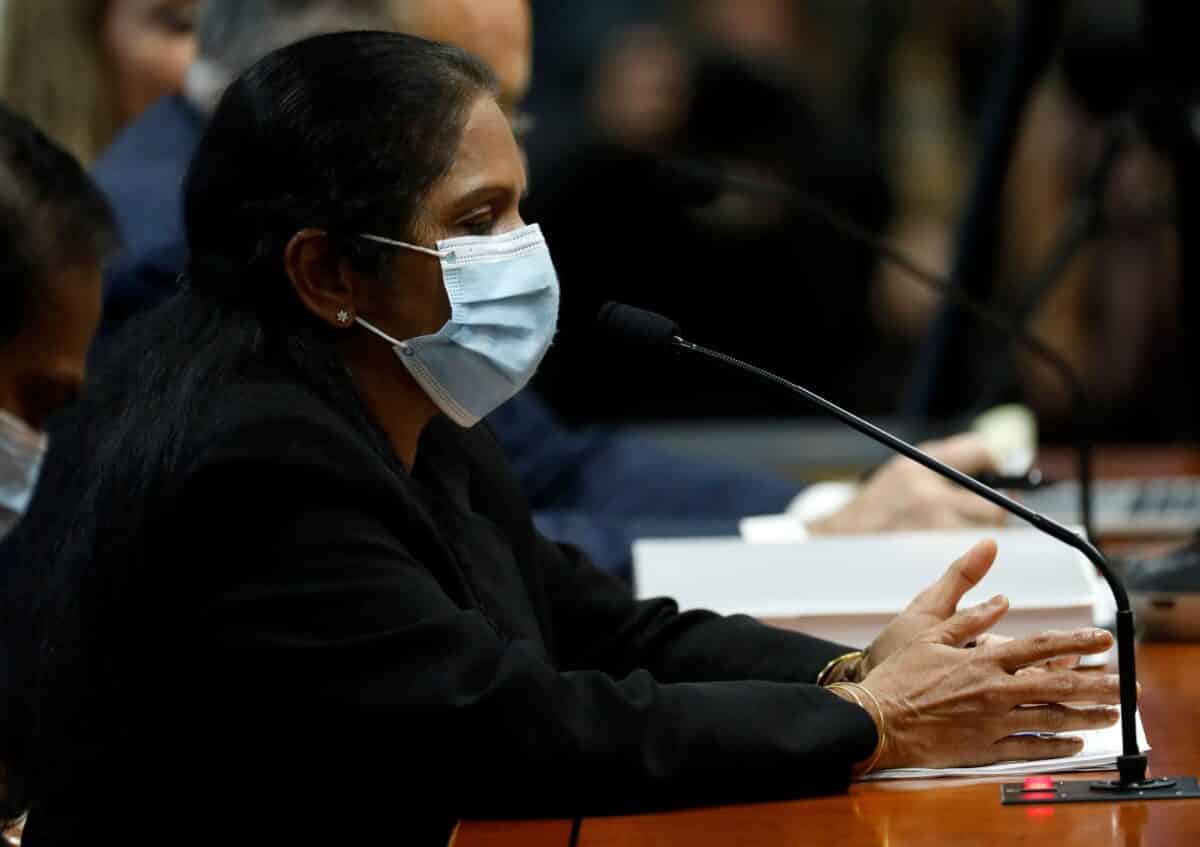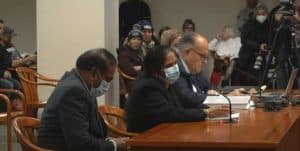Detroit local Jessy Jacob was on the verge of tears on Wednesday as she testified during a Lansing, Michigan, hearing about the intimidation and harassment she experienced while working as a ballot processor for Wayne County in the November election.
“They treated me like a criminal, humiliated me, harassed me,” Jacob said in her witness statement as she appeared alongside Trump campaign lawyers Rudy Giuliani and Jenna Ellis. “It was so bad.”
The public hearing was convened by the state’s Senate Oversight Committee after the state’s Board of Canvassers, made up of two Democrats and two Republicans, “unanimously asked this legislature to look into issues that have arisen in this election and to hear public testimony,” committee chair Sen. Ed McBroom (R-Vulcan) told those gathered at the proceedings.
“We are fulfilling the board’s request by holding this hearing,” he said. “We have a responsibility as legislators to ensure trust in voting results.”
Jacobs, a Detroit resident of 34 years, told the room that she had been marginalized by election officials on the morning of Nov. 4 because she refused to backdate absentee ballots, which according to state law, had to have been received by Nov. 3 at 9 p.m. to be counted.
“I couldn’t do anything, because when I am entering the ballot, I couldn’t lie about the date,” a distraught Jacobs said, after explaining that she had been told to enter ballots as received on Nov. 2 so that they could be counted.
She said she learned from another election worker that staff had been processing ballots all night, as fast as they could, at Detroit’s downtown convention hall, the TCF center, where much of the concerns over how absentee ballots were counted have been raised.
“So basically, what they were doing is entering all these ballots into the QVF (qualified voter file) so they can count these ballots—that’s what I thought.
“But they were not following the procedure,” Jacobs said, the most concerning of which was the opened ballot envelopes, with some having no postage stamp and a signature that didn’t match.
She told the hearing that according to the state manual for ballot processors, ballots once opened were to be immediately received and checked off against the polling book if verified by a signature match to accurately record the date received.
Then, there was the problem with the ballots. When she started processing her first ballot, she immediately noticed the ballot was invalid—it had been issued on Nov. 3 after the deadline for absentee ballot issuance, which was 4 p.m. on Nov. 2.
“So it was issued on Nov. 3, Election Day. It was issued, received, everything on Nov. 3. Then I checked whether that voter is newly registered. No, he was not registered on Nov. 3. He was registered sometime in 2010—ten years ago,” Jacobs said. “You are not supposed to issue absentee ballots on Election Day to already registered voters.”
She said she raised the problems with election officials in charge, and soon realized that no one else at the facility was following the process required to ensure only legal ballots were accepted.
She was then told by Chris Thomas, who was a contractor for the Detroit City Clerk’s Office and overseeing operations, “She’s right, but why should we punish voters for processor’s mistake?”
Later, she was told by a representative from the Michigan Department of State’s Bureau of Elections, “I don’t need you here, I don’t need any of your help, get out of here.”
Jessy Jacob, the City of Detroit’s Head Engineer, gives testimony at #MichiganHearing, says poll workers were processing OPENED ballots after Nov. 3 and backdating them, even when signatures did not match @news_ntd pic.twitter.com/83aCns1Q9D
— Melanie Sun (@MelanieYSun) December 3, 2020
“I really want to serve the City of Detroit, very truthfully and sincerely, that’s what I was doing all these 34 years I’ve been working with the city. My whole family, we’re proud that we’re, both me and my husband, both are working for the City of Detroit. I never expected this kind of treatment. It was really, really bad.”
“I had to go through this, so inhumane,” Jacob said, before she had to stop, holding back tears.
Michigan Secretary of State Jocelyn Benson, a Democrat and the state’s top election official, tried to reassure residents about the integrity of the state’s counting process for absentee ballots on Nov. 6, saying, “There were certainly a lot of eyes on the process.
“I’m proud of how transparent and secure our process has been,” she said in response to early affidavits from GOP poll challengers who testified that they had not been allowed sufficient access for oversight and that their challenges about ballot processing errors were not being taken seriously. “I know that the truth is on our side here,” she said.
Jacob told the hearing that on Nov. 4, she did not see a single GOP observer in the hall that day.
Giuliani argued that the hundreds of witnesses and expert affidavits now provided to the state held the power of evidence to support President Donald Trump’s concerns about election integrity.
“What we’ve heard is that there are unsubstantiated allegations of fraud … what began as unfounded allegations or fraud, then it became unsubstantiated allegations of fraud, then it became allegations of fraud but not big enough to overturn an election, and then it became allegations of fraud that really couldn’t be investigated between now and the election but are going to require substantial investigation after inauguration. So it’s changed a great deal,” he said.
Jacob ended her witness statement by telling the committee that she was “so thankful” for America and all the opportunities it had given her husband and three children.
“I am who I am because of this nation. I really love this country and I hope this will help this nation. That’s the only reason I am here,” she said.






